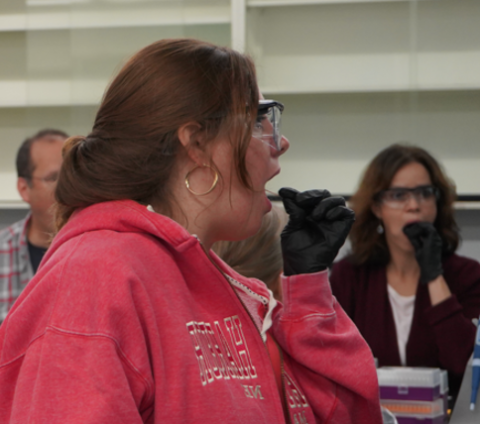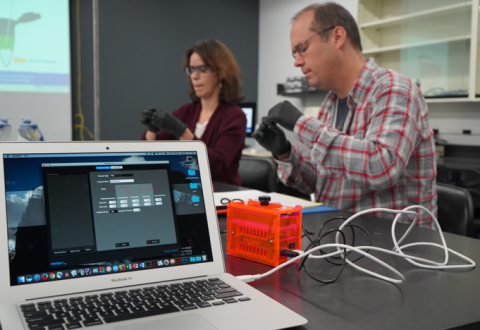A new school year is beginning now in the United States, and for some students, that means they will get exclusive access to a new ABE module, in the making for more than 3 years. The topic? Personalized medicine, with students exploring how genetics affects individuals’ reactions to medicines.
Ironically, the module was developed and piloted before the COVID-19 pandemic hit, and its debut was put on hold for a few years due to restrictions on students sampling their saliva. Now that those restrictions have been lifted, the swabs will be out in full force to help ABE students better understand the importance and potential of personalized medicine moving into the future.
“The Exploring Precision Medicine module brings up really interesting conversations for the students in terms of ‘how are we different?’ ‘Why are we different?’ ‘What does that mean?’ says Maia Binding, who leads ABE San Francisco Bay Area and conducted a professional development institute this summer for teachers in the Bay Area. “These differences can have some pretty clear ramifications when you are talking about treating medical conditions—such as whether your body metabolizes a medication or not, or whether or not your body will respond to medication or is super sensitive to a medication.”
That message hit home for the five teachers who participated in the training on the module this summer, in collaboration with one of program site leaders of ABE Massachusetts. Binding recalls that one of the participating teachers shared in the session how her son had just gone to a doctor’s appointment where they discussed the need to do genetic testing to better understand his response to a particular medication. “I think the students will really gravitate toward that concept, coupled with other discussions related to genetic diversity beyond medical treatments.”
The new module was piloted in the San Francisco, Los Angeles, and Boston areas, and high school students were able to participate in its development. Amaya Delgado, who just graduated from Stonehill College with a degree in biology, was one of those students. She fondly remembers working to develop primers for the new PCR protocol while a high school student with Essex North Shore Agricultural and Technical School, working through a co-op with ABE Massachusetts.
“It was a whole new experience of researching and seeing my research come to life once we received the new primers,” Delgado recalls. “I think the most challenging aspect was learning how to not get discouraged if something didn’t work.”
She is thrilled that the module is going to be used in classrooms so many years after its development. “It’s going to be so useful, especially in this day and age and with the rise of online classes and remote learning after the pandemic.”
Indeed, Binding says that teachers are excited to have the opportunity to re-engage in hands-on teaching about the genome. And one of the more memorable parts of the professional development institute, Binding says, was the teachers themselves participating in a science experiment that demonstrated the concepts of individual genomic differences.
In the PTC experiment, participants touch strips of paper with the chemical PTC on it to their tongues. Some people will taste very strong bitterness (with facial expressions to match the strong flavor!), whereas others might taste nothing, with a whole spectrum in between controlled by your personal genes. They can then run PCR on DNA samples from a cheek swab to see how the genomic results compare to those who reported being a “supertaster” or not. “It’s a great representation of how you can have individual variations in genes that cause a big difference in how your body responds to something,” Binding says.

Running this experiment with the teachers this summer was a blast. “It’s always so fun with a room of science teachers, especially to then hear the stories about when they have done this test in their classrooms,” Binding says. “A lot of teachers ham it up with their students.”
The hope, say Binding and Delgado, is that the module deepens students’ understanding of biotechnology. And the teachers came out of the summer institute with many positive things to say about the new module, such as “This is a really cool curriculum with great ties to current topics in biotech/medicine” and “This is a great addition to our biotech curriculum. I would also teach it in all levels of biology (great lab for Mendelian Genetics).”

Although its introduction is in only a few ABE sites to start, the goal is for it to eventually “make learning biotech easier for people all over the world,” says Delgado, who is now in the medical studies master’s program at Boston University. “I also hope that the module expands to more protocols so there are multiple opportunities for students to learn basic laboratory skills as well as get an interest in biotechnology like I did.”
